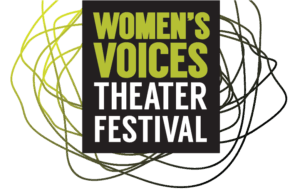Have you ever met someone who left you feeling as though there is nothing you can’t do? I got that feeling each time I sat down with four playwrights and a director who identify as women of color from the Women’s Voices Theater Festival. Each is a total badass in her own right. After talking to each of them, I felt so empowered. Their similar themes included the desire to be a part of the national conversation when it happens, not after the fact; having their works on the main stage, not the black box; and being seen as equal to the male playwrights who get offered more opportunities year round and not just one month out of the year.
This is the fourth installment of a five-part series talking with each of these phenomenal women. Today, I am talking with Heather Raffo, Playwright of Noura at Shakespeare Theatre Company. Noura tells the story of Iraqi immigrants living in New York.
Natalie Tucker: In the world of #MeToo and the #TimesUp movement, how important is the playwright of color’s voice to theater and entertainment world? The Women’s Voices Theater Festival?

My nature has always been to be a bridge builder. I’m an American with Iraqi heritage. Since I was 20 years old there has been a conflict with Iraq. My whole artistry has revolved around bridging these two identities. It’s because of the conflict that I stepped up. It’s the voices of our nation’s bridge builders that we need more now than ever.
What kind of research do you do, and how long do you spend researching before beginning a play?
I research anywhere from 2-10 years; I think I’m living plays and deeply thinking about them for years before they come out. I go deep into the communities I am writing about. I also engage with people who are challenging to the material that I’m writing. I don’t only talk to people that think the same way that I do. I’ve got to put it through the fire and hear from opposing sides.
What does success look like to you on the stage as a playwright?
Being produced on a main stage. For theaters to use my plays to target their biggest audiences. I want them to be confident that my plays will offer radically exciting conversation for all their audiences, not just a niche audience.
Success is also if American theaters can continue to support our next works. As a mother, you can’t work unless you’re being paid, because you are paying your babysitter $20 an hour. The fact that I had a massive hit with 9 Parts of Desire both in New York and regionally over 10 years ago, I still had to support myself and figure out how to write my next play. And then I had to prove to the American Theater it was a worthy piece to do by winning an award. Why did that have to take 13 years? When someone can say, she does this well, let’s support her.
Wouldn’t it be cool if theaters were supporting us and putting us in the pipeline BEFORE there was a crisis. Making us part of the conversation before we’re the hot topic, that is how we help frame the national conversation.
If you could say anything to your younger self, what would it be?
Something about demanding more. I was brave and spoke my truth but this moment in our national experiment is different, women are speaking their truths and they have an expectation that they will be responded to. I would say to my younger self – continue to be brave but have an expectation of being responded to. Expect that you will be supported and listened to. Demand it. That’s what I’m learning from the #metoo movement. We’ve all been doing it. Not apologizing. But the expectation that structural change is possible, is exciting.
Noura, written by Heather Raffo and directed by Joanna Settle, plays February 6 through March 11, 2018, at Shakespeare Theatre Company – 450 7th Street NW, in Washington, DC. For tickets, call (202) 547-1122 or go online.
Heather Raffo (Playwright)

Most recently, her libretto for the opera Fallujah was heard as part of Kennedy Center’s International Theater Festival. It then received its world premiere at Long Beach Opera in March of 2016 and opened at New York City Opera later that year. A film was made of the opera, as well as a documentary titled Fallujah: Art, Healing and PTSD.
Heather’s newest play, Noura, just won Williamstown Theatre Festival’s prestigious Weissberger Award. Noura came out of three years of workshops with Arab American women living in New York City, where Heather explored the themes of identity and belonging through her personal narrative initiative titled Places of Pilgrimage. In response to the participants’ many harrowing stories of leaving home, Heather shared with them Ibsen’s A Doll’s House. In tackling the iconic character of Noura, Raffo’s workshop provided a rare opportunity for women to discuss the contemporary challenge of being a modern woman who must bridge ties to both America and the Middle East. Noura was further developed at Georgetown University’s Laboratory for Global Performance and Politics with refugee and Middle East policy experts. Further workshops were supported by McCarter Theatre, Epic Theatre Ensemble and our nation’s first Arab American Museum in Dearborn, Michigan. Noura will receive its world premiere at the Shakespeare Theatre Company in D.C. in February 2018, before traveling to the Middle East for production in Abu Dhabi.
Raffo is the recipient of multiple grants from the Doris Duke Charitable Foundation to use theater as a means of bridge-building between her Eastern and Western cultures. She continues to grow her storytelling workshop, Places of Pilgrimage, taking it to universities and community centers both in America and the Middle East. Clips of participants’ work from her New York workshop have been shared online through the organizations Bridges of Understanding and Refugees Deeply, as a means to connect the stories of young Middle Eastern women with their peers globally. Raffo continues her focus on cross-cultural work by speaking at universities across America and internationally. Her work has taken her from classrooms in Tampa to the U.S. Islamic World Forum in Qatar, and from the Mercantile Library in Cincinnati to the Rumi Festival in Oslo. She is a proud member of Epic Theatre Ensemble’s Artistic Advisory Council and to her decade-long collaboration with Georgetown’s Laboratory for Global Performance and Politics.




